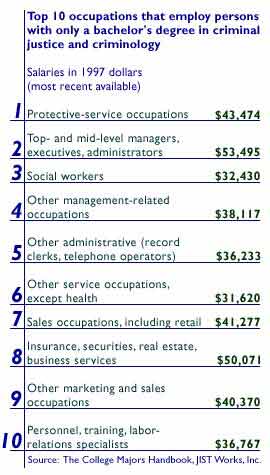NEW YORK (CNNfn) - Peter Pobocik, a 1999 graduate of Michigan State University, originally aspired to a career in law enforcement. Like many of his classmates, the criminal justice major had planned to join the local police force, or to pursue a post on the federal level that would allow him to flex his investigative muscle.
Instead, he landed a job as a security analyst for IBM Corp.'s offices in Boulder, Colo. – a career path Pobocik said he feels fortunate to have found.
"When I first started majoring in criminal justice I wanted to go into law enforcement or the FBI or something more exciting," he recalls. "Then, I got into [the coursework] and figured out [that security jobs for private corporations] were more my speed. It's more stable and there's not much moving around or long hours involved."
It's also better paying, not to mention one of the fastest growing job opportunities in the field.
"That's one of the reasons I went into private security," said Pobocik, who helps IBM keep its intellectual property private and coordinates security technology, including on-site cameras and alarms. "As the population increases, the police will be able to do less and less to prevent crime and big companies are going to have to create their own (in-house security team) to keep up."
Visit CNNfn's Career page regularly to read "Working your Degree," a new column that highlights job opportunities for a different college major each week. Click here for a list of previous profiles of the accounting, biology, political science, engineering, economics, and computer science, physical therapy, history and teaching professions.
The major
Criminal justice remains a popular choice of majors among college students.
Generally, bachelor's degree programs tend to offer three basic sequences: policing and security, legal studies, and criminology and corrections, notes The College Majors Handbook, published by JIST Works, Inc. Courses common to the major include victimology, computer crime, drug abuse and terrorism.
"There are many opportunities for students on the undergraduate level,"  said Tim Homberg, internship and career development coordinator for Michigan State University's School of Criminal Justice. "The private sector is where the pay scale gets a bit higher. We have a large percentage of our students who go into the asset protection and loss prevention fields for corporations and retailers large enough to have their own internal security departments." said Tim Homberg, internship and career development coordinator for Michigan State University's School of Criminal Justice. "The private sector is where the pay scale gets a bit higher. We have a large percentage of our students who go into the asset protection and loss prevention fields for corporations and retailers large enough to have their own internal security departments."
Depending on the region, starting salaries in the private security sector average about $30,000 to $35,000 a year.
Many criminal justice majors looking to work in the private sector, go on to provide investigative services or security for private individuals, events or corporations, MSU's brochure points out. Others, it notes, work as legal investigators helping lawyers prepare criminal defenses or as corporate investigators, conducting internal and external investigations to prevent drug use among company workers and theft of company assets.
There is also the opportunity to design and implement computer security systems and procedures as an independent contractor.
The arm of the law
As might be expected, many of the career options available to criminal justice majors still include law enforcement positions. The Handbook, in fact, points out that more than half (53 percent) of criminal justice majors with a bachelor's degree go on to work for federal, state and local governments in law enforcement or related management positions.
On the federal level, many join the Federal Bureau of Investigation (FBI), Drug Enforcement Bureau, Customs, U.S. Marshals Service and the Secret Service. Others work as police officers, parole officers and court officers.
On the state and local levels, the School of Criminal Justice at MSU notes that many of the same career possibilities exist, only on a smaller scale. Other options on these levels include: community policing, arson investigator, community relations representative, patrol officer, property administrator, homicide investigator, and victim's assistant.
And finally, on the corrections front, MSU's brochure notes a wide spectrum of job options exist, including that of a corrections officer, warden, and parole or probation officer. There are also opportunities to work on the administrative side of the fence, from facility operations to personnel inmates counseling.
Not all graduates trained in criminal justice remain within the field, however. Some 33 percent, the Handbook notes, work for private, for-profit corporations in jobs unrelated to their field of study. The most common reason for defecting? Money.
If you're looking to break into law enforcement or to major in criminal justice in college, the Bureau of Labor Statistics stresses the importance of a second language in enhancing your marketability, regardless of your degree level.
Also, be aware that government law enforcement candidates, under most circumstances, must be U.S. citizens, usually at least 20 years of age, and must meet rigorous physical and personal qualifications. Physical examinations for entrance into law enforcement often include tests of vision, hearing, strength, and agility.
Looking ahead
Job growth for police officers is expected to climb 21 percent to 35 percent through 2008, which is faster than the average for all occupations, the Bureau of Labor Statistics reports.
The agency also notes, however, that competition for law enforcement positions will remain fierce in higher paying jobs with state and federal agencies and with police departments in more affluent areas. That's because those are the most desireable positions in the field, and also because law enforcement officers in many agencies can retire with a pension after 20 to 25 years of service.
"Applicants with college training in police science, military police experience, or both should have the best opportunities," the BLS writes in its latest Occupational Outlook survey. "Opportunities will be best in urban communities whose departments offer relatively low salaries and where the crime rate is relatively high."
Police patrol officers in 1998, the most recent year for which federal data are available, earned roughly $38,000 a year, with a range of $22,000 to $64,000 depending on rank and years in the service.
Not including overtime pay, police and detective supervisors earn close to $49,000 per year, with a range of $29,000 to $85,000 annually. And detectives and criminal investigators earn roughly $46,000 a year, with the range being $28,000 to $80,000.

Correctional officers, who oversee individuals who have been arrested and are awaiting court trial or convicted of a crime and sentenced to serve time in jail, earn closer to $29,000 per year, with the lowest 10 percent earning less than $19,000 and the highest 10 percent earning $46,000. Job growth in this field is projected to grow 36 percent or more through 2008, much faster than the national average.
Lastly, job opportunities for private detectives and investigators are projected to climb 21 percent to 35 percent through 2008, also faster than the national average.
Median annual salaries in the field averaged $21,000 in 1998, but a study by Abbot Langer & Associates reveals salaries for security/loss prevention directors and vice presidents that same year were closer to $65,000 a year. Investigators earned roughly $49,000 and store detectives brought in about $18,000 per year.
Who's best suited for a degree in criminal justice?
"You'd have to be inquisitive and to question things," Pobocik said. "I think people who are interested in science (are well-suited) because they are interested in solving problems and learning new ways to do things. I would definitely recommend the degree." 
|

